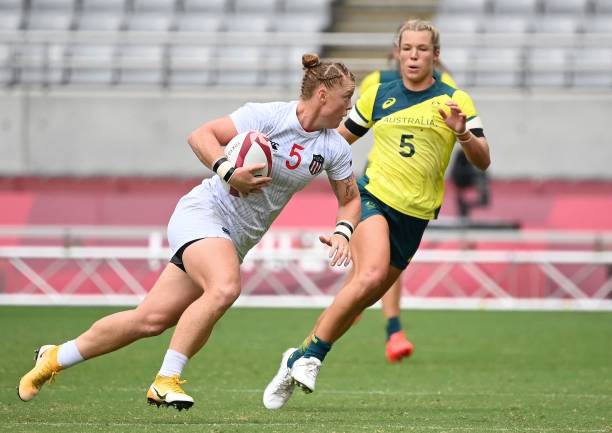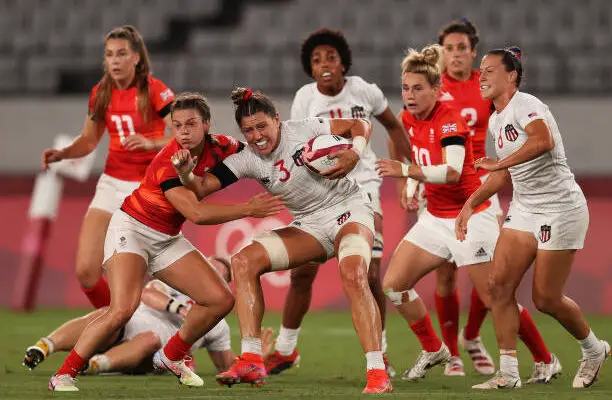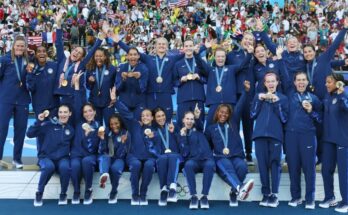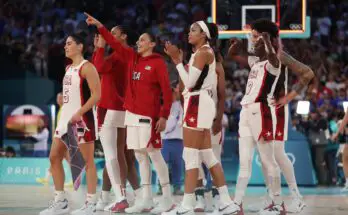Heading into Thursday evening’s rugby match between the United States and Australia, both teams were on similar paths. Each side already stamped their ticket into the knockout rounds of Olympic play. Both teams were on a collision course to decide the winner of Pool C. What followed was a thrilling comeback followed by an early morning exit from the medal podium. Even though USA rugby won’t leave Tokyo with a medal, there’s a lot of positives to take away, plus more rugby.
What is Rugby Sevens?
The Olympics include a form of rugby called rugby sevens. Historically, rugby union has dominated the world game. Union play are two sides of 15 players pushing, passing, and kicking their way into scoring points for two 40-minute halves. In sevens, each team plays with seven athletes for two seven-minute halves.
Teams earn points by kicking through the uprights or a try; crossing the try line, near the uprights, and tapping the ball to the ground, like a touchdown in American football.
With fewer players and less time on a field that’s 100 meters long and under 70 meters wide, sevens is a fast-paced, heavy-hitting, competition. It’s a game that includes some of the heavy tackling of American football without the pads or helmets and the strategy of soccer when it comes to moving up and down the field, and filling gaps and space.
USA Pool Play
USA’s rugby squad, along with the other 11 teams in the tournament, played in three groups of four. In a blistering three days of competition, with each team competing twice a day, the United States came out strong. USA rugby’s first two matches ended in 28-14 over China and 17-7 over Japan, but the real test came Thursday evening.
Australia came into the final Pool C match undefeated too. Against Japan, the defending gold medal champion Australia won in a 48-0 rout of the host nation. In a slightly more down-to-earth result, they beat China 26-10 seven hours later. Australia continued their dominance into much of their match against the United States.
USA v. Australia
From the kickoff, Australia controlled the narrative, pinning the United States back past their own 22-meter mark. In a game that advertises speed, the United States opts for strength, causing the need for a more methodical move out of their defensive zone. In the process, Australian athlete Evania Pelite took a blow to the head, requiring medical treatment for a bleeding gash. As is the m-o in rugby, the match continued, and Australia got on the board.
Australian Sharni Williams broke through the USA rugby defense. After the conversion (like an American football field goal), the Aussies were up 7-0. Like Australia’s first kickoff, their post-try kick pinned the United States back even further than before; putting the Eagles down seven at the half.
The United States second-half kickoff almost put them level. After winning possession soon after the kick, and only a few meters outside of the try line, the referee blew the whistle on the advancing United States attack for not releasing the ball.
Team USA didn’t agree, but Australia capitalized. Australia’s Demi Hayes ran the ball the length of the field for their second try off a quick tap of the ball. In a moment that would end up deciding the match, Williams missed the conversion.
Cheta Emba got the United States on the board first. Australia’s kickoff after their missed conversion was caught, compared to their first-half kickoffs going out of bounds. This allowed the Americans more space and time to stretch the field. USA veteran and standout Alev Kelter wove between the Australian defense, passing to Emba before the try line. With four minutes remaining, the United States is now down 12-7.

An Australian passing error ended up giving the United States the lead. Charlotte Caslick, of Australia, couldn’t bring in a pass, and USA rugby pounced. Off the turnover, Abby Gustaitis received a quick pass before giving team USA the lead.
The United States ate up the remaining two minutes on the clock with strong possession. Nia Toliver broke through a tackle that ate up precious time away from any potential Australian comeback, and the United States held on for a 14-12 victory.
Quarter Finals v. Great Britain
Great Britain entered the quarter-finals with two wins and one loss. Similar to Australia, GB is a quick team and are even more of a juxtaposition to the United States’ strength. Patience, positioning, and quick moves by Great Britain were the deciding factors in USA rugby’s first defeat in the Olympics.
Within two-and-a-half minutes, Great Britain scored two tries. Jasmine Joyce put GB up within 40 seconds, followed by a nice spin move by Holly Aitchison to double the advantage.
Team USA again had difficulty breaking through the defense to open the field. Great Britain’s defense was well disciplined, not trying to double or triple team a larger United States. Instead, GB was aware of the space on the field and filled holes, only jumping to tackle at the right time.
USA rugby went down further in the second half, with Joyce scoring another quick try 1:09 into the second half. GB was up 21-0, but in the group stage lost a match where they had the same score line, against New Zealand. There was a USA response, but GB learned from their past mistakes. Nicole Heavirland’s try put them on the scoreboard, but a missed conversion put the score at 21-5.
In added time, Naya Tapper scored a USA try, but the final whistle blew shortly after, ending the match 21-12.
What’s Next for USA Rugby?
Unlike other sports, like soccer, where knockout round games take a team completely out of the tournament, all teams in the tournament keep playing. The United States now play for fifth place. They’ll face China again, Friday at 9:30 p.m. ET. Win or lose, team USA plays either the winner or loser of the Russian Olympic Committee and Australia.
If the United States can win their last two matches, they’ll end the Olympics with the same fifth-place ranking as their 2016 Rio Olympics.
Follow Beyond Women’s Sports for more from the 2020 Tokyo Olympics. You can also follow Thomas Costello on Twitter @1ThomasCostello.




